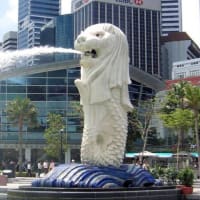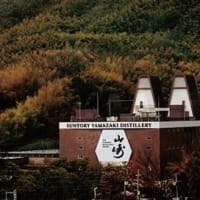
(4)Dishonest Abe?
(WSJ記事・2013年4月26日)
Dishonest Abe?
Talk about missing a good opportunity to keep quiet. Japanese Prime Minister Shinzo Abe—who in other news has been trying to revive his country's stagnant economy, manage a territorial dispute with China and stare down aggression from North Korea—was in the headlines again this week, but this time for all the wrong reasons. Apparently he couldn't resist offering a revisionist history lesson on World War II.
A controversy already had erupted over the weekend when members of parliament, including three cabinet ministers, visited Tokyo's Yasukuni Shrine. Trips to the religious site are politically fraught since Japanese believe it houses the souls of war dead, including several alleged war criminals. In response to the uproar, Mr. Abe on Tuesday took to the floor of the Diet to question whether Japan had really "invaded" its neighbors in the run-up to the war. "The definition of what constitutes an 'invasion' has yet to be established in academia or in the international community," the Journal quoted Mr. Abe saying. "Things that happened between nations will look different depending on which side you view them from."
Things sure "look different" from South Korea, where debate still lingers over whether Japan has adequately apologized to, and compensated, the so-called comfort women forced into prostitution by Japanese troops during the war. The Rape of Nanking is a raw memory in China, not least since some obdurate Japanese persist in debating how much of a massacre it really was. ・・・
誠実さを欠く安倍首相?
沈黙し続ければ好機を逃す。どうも、そうとばかりでもないようだ。日本の安倍晋三首相を--低迷する自国経済の再生に挑み、支那との領土紛争を巧みに処理して、更には、北朝鮮を睨み倒して攻撃を手控えさせた、そんな活躍の様子が報道されてきた安倍首相を--世界の報道機関が今週大きく取り上げた。しかし、今回はあまりよくない理由によるものだけれども。蓋し、大方の見るところどうも彼は第二次世界大戦についての修正主義的な歴史の授業をしたくてたまらないらしいのだ。
論戦は今週末すでに勃発していた。今週末、安倍内閣の3人の閣僚を含む国会議員が東京にある靖国神社を訪れたのを合図に論戦の火蓋が切られたということ。この宗教施設への訪問は政治的にはかなりの危険をともなう行為である。なぜならば、靖国神社には戦死者の御魂が宿っていると日本人は信じており、他方、その戦死者の中には戦犯であると断罪された--その断罪が正しかったかどうかは別にして、とにかく戦犯として断罪された(alleged)--幾人かも含まれているのだから。而して、この激論の狂瀾に反応したのだろうか、火曜日に【2013年4月23日】第二次世界大戦に至る過程で日本が近隣諸国を「侵略」したのかどうかは一概に言えることではないのではないかという疑義を国会で述べることで、安倍首相もこの狂瀾の舞踏会の輪の中に入ってしまった。「侵略という定義は、学界的にも国際的にも定まっていない」とは国会議事録に記録された安倍首相のこのときの発言。「国と国の関係で、どちら側から見るかで違う」という発言もまた議事録に記録されている。
確かに、韓国から見れば物事は「異なって見える」にちがいない。韓国内では、日本はもうすでに韓国に対してきちんと謝罪しているものかどうか、あるいは、所謂「従軍慰安婦」なるものに対して日本はすでにきちんと償いを終えているのかどうか、これらを巡る執拗にまとわりついてくる堂々巡りの議論がいまだに続いているのだから。尚、所謂「従軍慰安婦」なるものとは第二次世界大戦中に日本の軍隊によって売春を強要された人々のことである。他方、支那では<南京大虐殺>は生々しい記憶である。特に、<南京大虐殺>に際して、本当の所、何人が虐殺されたのかという疑問を繰り返し繰り返し持ち出してくる強情な日本人に遭遇した場合には一層生々しい記憶になる。(中略)

Such historical ructions break out periodically in Japan, but the timing of this round is particularly bad. China's Communist Party has a long track record of using the notion of a "century of humiliation" at foreign hands before 1949—in which Japan's occupation figures prominently—to stoke nationalism and justify Party rule. Reviving bad memories in the midst of a territorial dispute in which Beijing is adopting an ever more aggressive tone surely isn't a good idea. Similarly, Mr. Abe has created needless friction with Seoul at a time when both governments should be working together on strategies to contain Pyongyang.
And although Mr. Abe's remarks play well with his right-wing base, other Japanese are much warier. This raises the prospect that it will be harder for Mr. Abe to win support for a constitutional change that would allow the Japanese military to play a more active role in providing for regional security. It also exacerbates the headache Asia already is causing Washington. Japan has been a firm U.S. ally since 1945. Now more than ever, with China growing more assertive in the region and Pyongyang becoming stroppier, Washington would benefit from a strong Japan enjoying good relations with its democratic neighbors. Mr. Abe's faulty history could become a serious risk today if he's not careful.
歴史認識を巡る今回のような騒動は周期的に日本で勃発する。しかし、今回の騒動勃発のタイミングはいかにも拙い。支那が外国に牛耳られてきた1949年以前の「屈辱の1世紀」という観念を--しかも、その「屈辱の1世紀」なるものの中で日本による占領が特筆大書されるのだけれども、そんな「屈辱の1世紀」なる観念を--ナショナリズムを高揚させるべく、および、共産党支配を正当化するために持ちだして来るのは支那の共産党の年来の常套手段だろう。ならば、支那政府がこれまでにないほど強気の構えを崩そうとしない領土を巡る紛争が続いている最中に、日本の悪い印象を連想させる記憶を呼び起こす行動は賢いとは言えまい。同様に、北朝鮮を封じ込めるべく日本と韓国が連帯して、かつ、戦略的に行動すべきちょうどそのときに、安倍首相は韓国と不必要な摩擦を引き起こしてしまったのだ。
加之、安倍首相が発した所見は首相自身の中核的な支持基盤である右翼に対しては、彼等からより強固な支持を取り付ける意味があるとしても、他の日本国民は首相の所見に接して寧ろより注意深く安倍政権を評価しようとしている。日本社会の現状をこのように俯瞰するとき、憲法の改正について日本国民からの支持を得ることはより難しくなるのではないかと予想される。ちなみに、その憲法の改正が実現すれば東アジアにおける安全保障のために日本の軍隊はより積極的な役割を担うことも可能になるのではあるけれども。加之、歴史に誠実に向き合わない姿勢は、今でも充分にアメリカ政府を悩ませているアジアは、アメリカ政府にとって一層深刻な頭痛の種になろう(Asia already is causing Washington a headache)。日本は、1945年以来の【不動のセンターの前田敦子ちゃんじゃなかった】不動のアメリカの同盟国だ【この「since 1945」は明確な間違い。但し、原文に従った】。蓋し、支那が今後一層自己中の度合いを増すにともない、あるいは、北朝鮮が今後一層キレやすくなるにともない、今までのどの時期にも増して強い日本から--もし、日本がそんな強い日本になるのであれば--アメリカが受け恩恵は大きなものになるだろう。而して、強い日本とは近隣の民主主義諸国との良好な関係を享受する日本のことだ。畢竟、安倍首相の欠陥の多い歴史認識は、安倍首相がより慎重に行動しないのなら、今の今においても深刻なリスクを惹起しかねないのである。

<続く>



















